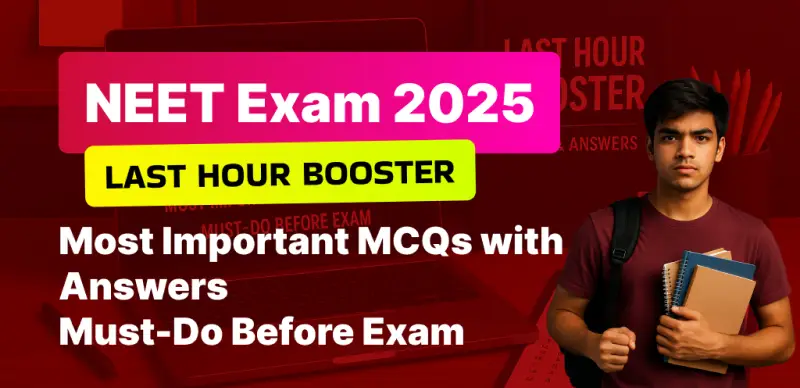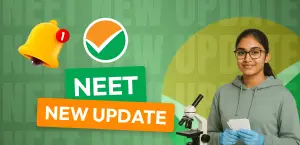NEET Exam 2025 : Most Important MCQs with Answers - Must-Do Before Exam

SHARING IS CARING
If our Website helped you a little, then kindly spread our voice using Social Networks. Spread our word to your readers, friends, teachers, students & all those close ones who deserve to know what you know now.
Get exam-ready with our NEET 2025 Last Hour Booster! This guide features the most important MCQs with detailed answers to sharpen your revision.
In this article, NEET 2025 important questions are presented for NEET aspirants 2025. The set of important questions presented in this article focuses on providing NEET 2025 aspirants with all the important questions and answers so that they can practice and perform well in their exams going forward.
👉 Read Also - NEET 2025 Physics: Most Important MCQs with Answers
Below are the most important questions from the subjects - Physics, Chemistry and Biology - to help students streamline their revision process and boost their readiness for the NEET exam.
NEET 2025 Last Hour Booster: Most Important MCQs with Answers
1. Which hormone regulates sodium reabsorption in kidneys?
A) Aldosterone
B) Insulin
C) Thyroxine
D) Adrenaline
Answer - A) Aldosterone
2. Which type of bond is present in a diatomic oxygen molecule (O₂)?
A) Single covalent
B) Double covalent
C) Triple covalent
D) Ionic
Answer - B) Double covalent
3. What is the unit of magnetic flux?
A) Tesla
B) Weber
C) Henry
D) Ohm
Answer - B) Weber
👉 Read Also - NEET Physics 2025: Most Expected Questions with Solution
4. Which part of the nephron is mainly responsible for selective reabsorption?
A) Bowman’s capsule
B) Proximal convoluted tubule
C) Loop of Henle
D) Collecting duct
Answer - B) Proximal convoluted tubule
5. What is the hybridization of carbon in methane (CH₄)?
A) sp
B) sp²
C) sp³
D) sp³d
Answer - C) sp³
6. The energy required to remove an electron from a neutral isolated gaseous atom is called:
A) Electron affinity
B) Ionization energy
C) Electronegativity
D) Lattice energy
Answer - B) Ionization energy
👉 Read Also - NEET 2025: Most Repeated PYQs – Free PDF Download to Crack the Exam
7. Which law is used to explain the working of a transformer?
A) Coulomb’s law
B) Faraday’s law
C) Ohm’s law
D) Ampere’s law
Answer - B) Faraday’s law
8. Which phylum includes starfish?
A) Mollusca
B) Echinodermata
C) Arthropoda
D) Annelida
Answer - B) Echinodermata
👉 Read Also - NEET 2025 : High Scoring Topics in Physics, Chemistry, Biology Quick Revision Guide
9. The rate of reaction doubles when the temperature increases by about:
A) 5°C
B) 10°C
C) 15°C
D) 20°C
Answer - B) 10°C
10. The lens used in a simple microscope is:
A) Concave
B) Convex
C) Plano-concave
D) Cylindrical
Answer - B) Convex
11. Which enzyme converts glucose to glucose-6-phosphate?
A) Amylase
B) Glucokinase
C) Lipase
D) Maltase
Answer - B) Glucokinase
12. The number of ATP molecules produced from one molecule of glucose during aerobic respiration is:
A) 2
B) 18
C) 36
D) 38
Answer - D) 38
13. What is the molecular geometry of water (H₂O)?
A) Linear
B) Trigonal planar
C) Bent
D) Tetrahedral
Answer - C) Bent
14. What is the speed of light in a vacuum?
A) 3×10⁸ m/s
B) 2.2×10⁸ m/s
C) 3×10⁶ m/s
D) 9.8×10⁸ m/s
Answer - A) 3×10⁸ m/s
15. Which structure in a plant is responsible for transpiration?
A) Phloem
B) Stomata
C) Xylem
D) Root hairs
Answer - B) Stomata
16. The main nitrogenous waste in humans is:
A) Ammonia
B) Urea
C) Uric acid
D) Creatinine
Answer - B) Urea
17. The product of photosynthesis is:
A) Glucose
B) Oxygen
C) Both A and B
D) Carbon dioxide
Answer - C) Both A and B
18. The IUPAC name of CH₃-CH₂-COOH is:
A) Acetic acid
B) Propanoic acid
C) Butanoic acid
D) Ethanoic acid
Answer - B) Propanoic acid
19. Which gland secretes insulin?
A) Adrenal
B) Thyroid
C) Pituitary
D) Pancreas
Answer - D) Pancreas
20. The SI unit of power is:
A) Joule
B) Watt
C) Newton
D) Ampere
Answer - B) Watt
21. The charge of an electron is:
A) +1.6×10⁻¹⁹ C
B) –1.6×10⁻¹⁹ C
C) +1.6×10⁻¹⁸ C
D) –1.6×10⁻¹⁸ C
Answer - B) –1.6×10⁻¹⁹ C
22. The largest part of the human brain is:
A) Cerebellum
B) Cerebrum
C) Medulla
D) Thalamus
Answer - B) Cerebrum
23. The formula of washing soda is:
A) NaHCO₃
B) Na₂CO₃
C) Na₂CO₃·10H₂O
D) NaOH
Answer - C) Na₂CO₃·10H₂O
24. Which planet is known as the red planet?
A) Earth
B) Mars
C) Jupiter
D) Venus
Answer - B) Mars
25. Which vitamin helps in blood clotting?
A) A
B) B
C) K
D) D
Answer - C) K
26. What type of mirror is used in vehicle headlights?
A) Convex
B) Concave
C) Plane
D) Cylindrical
Answer - B) Concave
27. The backbone of DNA is made up of:
A) Ribose and phosphate
B) Deoxyribose and phosphate
C) Nitrogenous bases
D) Ribose and nitrogenous bases
Answer - B) Deoxyribose and phosphate
28. The oxidation number of nitrogen in NH₃ is:
A) +3
B) –3
C) 0
D) +1
Answer - B) –3
29. What is the normal pH of human blood?
A) 6.8
B) 7.4
C) 7.0
D) 7.8
Answer - B) 7.4
30. Name the law: PV = constant.
A) Boyle’s law
B) Charles’s law
C) Gay-Lussac’s law
D) Avogadro’s law
Answer - A) Boyle’s law
31. Which structure connects muscles to bones?
A) Ligaments
B) Tendons
C) Cartilage
D) Synapse
Answer - B) Tendons
32. Which gas is responsible for the greenhouse effect?
A) Nitrogen
B) Oxygen
C) Carbon dioxide
D) Neon
Answer - C) Carbon dioxide
33. The basic unit of heredity is:
A) DNA
B) Chromosome
C) Gene
D) Nucleus
Answer - C) Gene
34. What is Avogadro’s number?
A) 3.02×10²³
B) 6.02×10²³
C) 6.02×10²²
D) 3.02×10²²
Answer - B) 6.02×10²³
35. Which instrument measures electric current?
A) Voltmeter
B) Ammeter
C) Ohmmeter
D) Galvanometer
Answer - B) Ammeter
36. Which disease is caused by a deficiency of iodine?
A) Rickets
B) Goitre
C) Scurvy
D) Beriberi
Answer - B) Goitre
37. In photosynthesis, light energy is converted into:
A) Electrical energy
B) Mechanical energy
C) Chemical energy
D) Heat energy
Answer - C) Chemical energy
38. The molecular formula of benzene is:
A) C₅H₆
B) C₆H₆
C) C₇H₈
D) C₈H₁₀
Answer - B) C₆H₆
39. The largest artery in the human body is:
A) Pulmonary vein
B) Aorta
C) Coronary artery
D) Vena cava
Answer - B) Aorta
40. What type of reaction is: Zn + H₂SO₄ → ZnSO₄ + H₂?
A) Decomposition
B) Displacement
C) Double displacement
D) Combination
Answer - B) Displacement
41. The father of modern periodic table is:
A) Newlands
B) Mendeleev
C) Moseley
D) Dalton
Answer - B) Mendeleev
42. Which of the following is an amphibian?
A) Snake
B) Frog
C) Crocodile
D) Pigeon
Answer - B) Frog
43. Which process converts nitrogen gas into ammonia?
A) Nitrification
B) Denitrification
C) Nitrogen fixation
D) Ammonification
Answer - C) Nitrogen fixation
44. The order of draw in blood collection begins with which tube?
A) Red
B) Yellow
C) Blue
D) Purple
Answer - B) Yellow
45. Which organelle is known as the powerhouse of the cell?
A) Nucleus
B) Ribosome
C) Mitochondria
D) Chloroplast
Answer - C) Mitochondria
46. The number of neutrons in carbon-14 is:
A) 6
B) 8
C) 14
D) 12
Answer - B) 8
47. Which rule determines the direction of induced current?
A) Fleming’s right-hand rule
B) Fleming’s left-hand rule
C) Lenz’s law
D) Ohm’s law
Answer - C) Lenz’s law
48. What is the main constituent of biogas?
A) Ethane
B) Methane
C) Propane
D) Butane
Answer - B) Methane
49. The chemical formula of gypsum is:
A) CaCO₃
B) CaSO₄
C) CaSO₄·2H₂O
D) Ca(OH)₂
Answer - C) CaSO₄·2H₂O
50. Which blood group is a universal donor?
A) A
B) B
C) AB
D) O
Answer - D) O
👉 Read Also - NEET 2025 Fortnightly Test Series : Get Free Practice Papers & Solutions
👉 Read Also - NEET 2025 Leader Unit Test Series: Free Mock Practice Tests with Solutions
👉 Read Also - NEET 2025 Champion Unit Test Series: Get Free Practice Papers & Solutions
👉 Read Also - NEET 2025 Concept Booster Test Series : Get Free Practice Test & Solutions
👉 Read Also - NEET 2025 Booster Test Series: Free Mock Practice Tests with Solutions
👉 Read Also - NEET 2025 Target Exam Series: Free Mock Practice Tests with Solutions
👉 Read Also - NEET 2025 Crash Test Series: Free Mock Practice Tests with Solutions







 Profile
Profile Signout
Signout












 Quiz
Quiz
 Get latest Exam Updates
Get latest Exam Updates 










